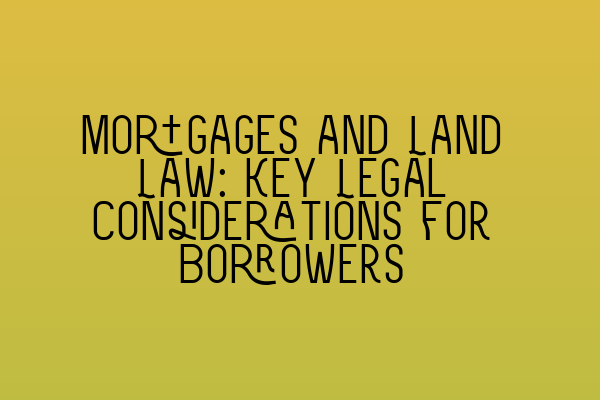MORTGAGES AND LAND LAW: KEY LEGAL CONSIDERATIONS FOR BORROWERS
Welcome to SQE Property Law & Land Law! As experts in property law, we understand the intricacies of mortgages and land law, and we’re here to guide you through the key legal considerations that borrowers need to be aware of. Whether you are a first-time homebuyer or an experienced property investor, understanding the legal aspects of mortgages is crucial to ensure a smooth and successful transaction. So, let’s dive into the world of mortgages and land law.
1. Key Terms and Concepts:
Before delving into the legal considerations, let’s briefly cover some key terms and concepts commonly associated with mortgages and land law:
– Mortgage: A legal agreement where a borrower pledges their property as collateral for a loan. The lender, typically a bank or a financial institution, holds the rights to the property until the loan is repaid.
– Security: The property offered as collateral for the mortgage is referred to as the security. It acts as a guarantee for the lender in case of default by the borrower.
– Repayment: The borrower is required to make regular payments, either in the form of principal and interest or interest-only, to repay the loan over a specified period.
– Foreclosure: In the event of loan default, the lender has the right to take possession of the property through a legal process known as foreclosure.
– Equity: The value of the property minus any outstanding mortgage debt. As the borrower makes mortgage payments, their equity in the property increases.
Now that we have a basic understanding of the key terms, let’s explore the legal considerations borrowers should keep in mind.
2. Due Diligence:
Before entering into a mortgage agreement, it is crucial for borrowers to conduct thorough due diligence. This includes:
– Property Search: Ensure that the property you intend to purchase has a clean title, free from any encumbrances or legal disputes.
– Land Registry: Check the Land Registry for any restrictions, covenants, or other legal interests affecting the property.
– Local Authority Searches: Obtain local authority searches to uncover any planning restrictions, environmental issues, or outstanding charges on the property.
By conducting due diligence, you can identify any potential legal issues that may impact your rights as a borrower.
3. Mortgage Offer and Documentation:
Once you’ve found the right property and completed your due diligence, the next step is to secure a mortgage offer from a lender. The mortgage offer will include:
– Conditions: The lender may impose certain conditions, such as a minimum deposit or a requirement for mortgage insurance.
– Interest Rate: The interest rate on the mortgage will determine your monthly repayments. Compare rates from different lenders to ensure you’re getting the best deal.
– Repayment Terms: Carefully review the repayment terms, including the length of the mortgage, payment frequency, and any early repayment penalties.
It is crucial to review the mortgage offer and seek legal advice to ensure you understand the terms and conditions before signing any documentation. Engaging a solicitor who specializes in property law can provide valuable guidance throughout the process.
4. Property Ownership and Restrictions:
Once the mortgage documentation is in place, you’ll become the legal owner of the property. However, it’s important to be aware of any restrictions or obligations that may apply, including:
– Restrictive Covenants: These are enforceable legal restrictions that limit the use of the property or impose obligations on the owner. For example, some properties may have restrictions on subletting or building extensions.
– Leasehold Properties: If you’re buying a leasehold property, you should understand the terms and conditions of the lease, including ground rent, service charges, and lease extension rights.
Reviewing the legal implications of property ownership and any associated restrictions will help you make informed decisions and avoid potential legal issues in the future.
5. Repayment and Default:
Once your mortgage is in place, it’s crucial to make your repayments on time to avoid default. Defaulting on your mortgage can have serious legal implications, including foreclosure and repossession of the property by the lender. Here are some key points to remember:
– Regular Payments: Ensure you make your mortgage payments in a timely manner to maintain a good credit history and avoid default.
– Financial Hardship: If you encounter financial difficulties, contact your lender immediately to discuss alternative payment arrangements.
– Seek Legal Advice: If you’re facing the possibility of default, seek legal advice from a property law solicitor who can guide you through the legal implications and potential options.
Remember, preventing default is crucial to protect your interests as a borrower and maintain your ownership rights.
In conclusion, mortgages and land law have significant legal considerations that borrowers need to be aware of. Conducting due diligence, understanding mortgage offers and documentation, reviewing property restrictions, and ensuring timely repayments are vital steps in protecting your rights as a borrower. If you require expert legal advice or assistance with your mortgage transaction, consult SQE Property Law & Land Law for professional guidance.
Related Articles:
– SQE 1 Practice Exam Questions
– SQE 1 Practice Mocks FLK1 FLK2
– SQE 2 Preparation Courses
– SQE 1 Preparation Courses
– SRA SQE Exam Dates
